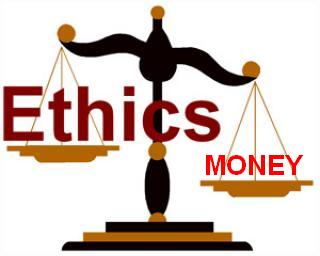After hearing a lot about unethical marketing in the media lately, I stumbled upon an article which has absolutely shocked me. In this article from the British Medical Journal I have discovered that sales representatives of Warner-Lambert (a drug company) were caught bribing doctors in order to be allowed to speak with patients in order to promote their own products. Dr.Franklin then decided to sue Warner-Lambert after finding out that they were finding out “whether doctors prescribed gabapentin (epilepsy/seizure drug) and rewarded those who were considered high volume prescribers by paying them as speakers and consultants and also paying them to enter patients in clinical trials”. Furthermore this company was bribing doctors to allow their sales agents to be in the same room when the doctors were examining their patients.
 Personally I believe this is a huge issue. Firstly it is because it revolves around healthcare which is such a sensitive topic. Under no circumstances should sales representatives be allowed in the examination room while the patients are seeing a doctor. This represents direct breach of medical privacy, in addition to corruption. In this case Warner-Lamber was trying to promote a drug for unapproved use, which could have serious medical issues on the patients. Lastly according to Dr.Franklin’s claims, Warner-Lamber was paying doctors to publish articles with positive feedback regarding their drugs, and going as far as saying that they were “hiring a marketing company to write first drafts”.
Personally I believe this is a huge issue. Firstly it is because it revolves around healthcare which is such a sensitive topic. Under no circumstances should sales representatives be allowed in the examination room while the patients are seeing a doctor. This represents direct breach of medical privacy, in addition to corruption. In this case Warner-Lamber was trying to promote a drug for unapproved use, which could have serious medical issues on the patients. Lastly according to Dr.Franklin’s claims, Warner-Lamber was paying doctors to publish articles with positive feedback regarding their drugs, and going as far as saying that they were “hiring a marketing company to write first drafts”.
This article demonstrates just how far some companies are willing to go in order to capture a larger market share and increase their revenue. However at what costs? In this case the stakes are huge since we are dealing with healthcare and prescribed drugs. After reading this one is left thinking about just how accurate and safe is the medicine that is prescribed by doctors; Is it really what they think is best for the patient, or is somebody influencing them to promote a drug?
Work Cited:
“Doctor sues company over unethical marketing.” National Center for Biotechnology Information. N.p., n.d. Web. 21 Jan. 2013. <http://www.ncbi.nlm.nih.gov/pmc/articles/PMC1123209/>

I agree that the nature of this is very unethical, but I wonder if it’d still be as unethical under a different context. For example, if testing drugs for terminal illnesses would the actions you descried above be less unethical? Personally, I feel it would be less unethical. But that being said, if organ donation is a choice then people on the brink of death should be given a choice too.